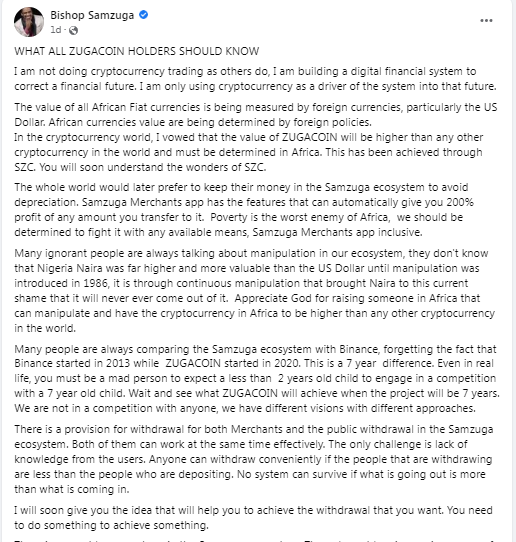[ad_1]

After reports that merchants and holders of “Zugacoin” cryptocurrency are unable to make withdrawals, the founder of the Nigerian crypto, Sam Zuga responded by accusing unnamed “ignorant people” of working to tarnish the project. One Nigerian expert has advised prospective zugacoin investors to prioritize learning finer details about the project before investing.
A Financial System for the Future
As promoters of zugacoin — a Nigerian cryptocurrency ostensibly created to end poverty in Africa — continue to tout the token as a legitimate digital currency, there are growing reports on social media of merchants and holders of the coin who have failed to withdraw. These reports have sparked allegations that the project is yet another scam which is cleverly disguised as a complex cryptocurrency project.
The complaints and allegations against the project have, in turn, prompted Archbishop Sam Zuga, the founder of Zugacoin, to issue a flurry of Facebook posts condemning “ignorant people” peddling false information about the project. In one of his latest posts, Zuga said he was not engaged in cryptocurrency trading but was instead “building a digital financial system to correct a financial future.” He added that his crypto, which “automatically gives you 200% profit of any amount you transfer to it,” is only being used as a “driver of the system into that future.”

In the lengthy August 25, 2022 post, the founder denies allegations of manipulation within the Zugacoin ecosystem. Zuga’s post also explains how the ecosystem works and why some holders may be having problems withdrawing. He said:
“The only challenge is lack of knowledge from the users. Anyone can withdraw conveniently if the people that are withdrawing are less than the people who are depositing. No system can survive if what is going out is more than what is coming in.
“There is no problem anywhere in the Samzuga ecosystem. The only problem is your ignorance of how the system has been designed to work. Merchants can transfer money from the Merchant area of the merchant app to the Merchants wallet and from there to P2P conveniently.”
In his earlier Facebook posts, Zuga similarly attacks unnamed individuals whom he accuses of besmirching the “noble project” with their ignorance.
Experts Question Project’s Lack of Transparency
However, despite Zuga’s spirited defense of the crypto project, influential players in Nigeria’s blockchain industry told Bitcoin.com News they remained unconvinced. They point to the project’s lack of transparency or its apparent exploitation of Nigerian people’s affinity to religion or their religious leaders as red flags.
One of the players, Ophi Rume, aka “Cryptopreacher,” told Bitcoin.com News that unless the Zugacoin founder reveals the rest of the team behind the project it will be difficult to make a judgment about the project’s legitimacy. Noting that scammers often exploit people’s desperation and ignorance, Rume, a blockchain analyst and educator, said ordinary Nigerians should only consider investing in this project after doing some basic due diligence. He noted:
As basic as searching for the words; Is Zugacoin a scam or a Ponzi scheme via Google, Nigerians can read and learn a lot of things about this project. Also, before investing Nigerians need to know those involved in the project. They need to know the board of directors, the developers and whether the project is on Github.
According to Rume, when prospective investors learn or become aware of such details about this project they will likely decide against investing and thus preserve their meager savings.
Meanwhile, another expert who wished to remain anonymous lamented scammers’ growing use of religious titles when marketing their projects to unsuspecting victims. According to the expert, when a dubious cryptocurrency project is fronted by a religious leader, people will refrain from criticizing it. The expert explained:
“I have found that no one wants to be seen as the prophet of doom or enemy of progress when it comes to big and questionable projects like Zuga. Besides, the founder is a Christian leader with a considerable following who has also used his influence to project Zuga out there. Remember Inksnation.”
For Paul Ezeafulukwe, the former president of Stakeholders in Blockchain Technology Association of Nigeria (SIBAN) and the team lead at Bitget Africa, zugacoin is the most volatile cryptocurrency and one that has totally failed to deliver on its promises. Some of the promises include claims that the cryptocurrency will end poverty as well as help Nigeria reduce its debt.
“Another promise they have made which is like tales by moonlight is their ability to pay $97 billion dollars worth of Nigeria’s national debt and also help Africa clear her debts. From their position it is clear they don’t understand how cryptocurrencies work, I believe the promoters were sold a lie that your ability to mint a token could translate to instant monetary value without building an ecosystem to support the utility of the token,” explained the ex-SIBAN leader.
Ezeafulukwe said it is unfortunate that some poor and gullible individuals have invested in zugacoin based on these promises. For investors who are still thinking of buying zugacoin, Ezeafulukwe said they must “look at these two promises [poverty eradiction and paying off Nigeria’s debt] and do simple research to find out if these things are possible by a single individual.”
Register your email here to get a weekly update on African news sent to your inbox:
What are your thoughts on this story? Let us know what you think in the comments section below.
Image Credits: Shutterstock, Pixabay, Wiki Commons
Disclaimer: This article is for informational purposes only. It is not a direct offer or solicitation of an offer to buy or sell, or a recommendation or endorsement of any products, services, or companies. Bitcoin.com does not provide investment, tax, legal, or accounting advice. Neither the company nor the author is responsible, directly or indirectly, for any damage or loss caused or alleged to be caused by or in connection with the use of or reliance on any content, goods or services mentioned in this article.
[ad_2]
Source link



